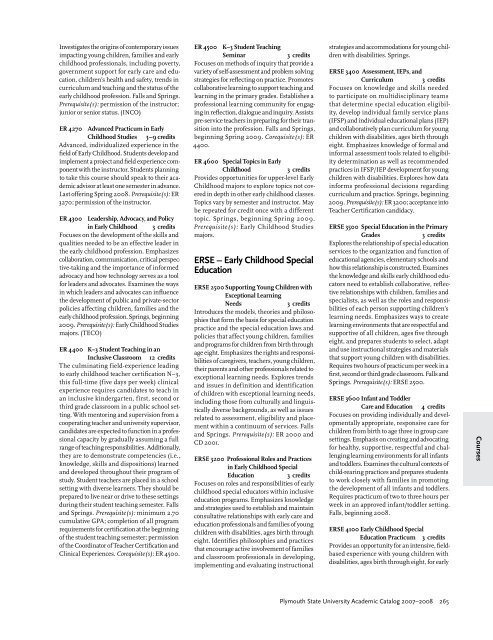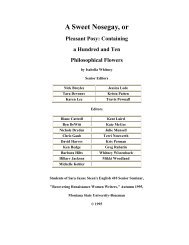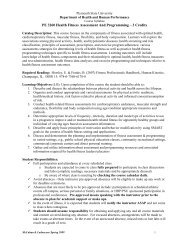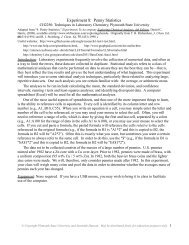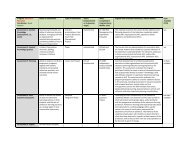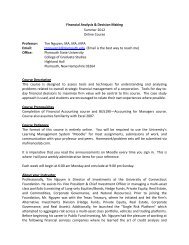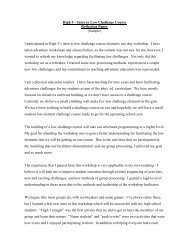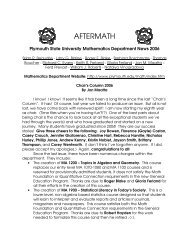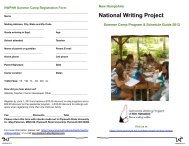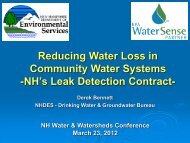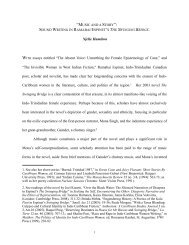2007-2008 Undergraduate Academic Catalog - Plymouth State ...
2007-2008 Undergraduate Academic Catalog - Plymouth State ...
2007-2008 Undergraduate Academic Catalog - Plymouth State ...
- No tags were found...
You also want an ePaper? Increase the reach of your titles
YUMPU automatically turns print PDFs into web optimized ePapers that Google loves.
Investigates the origins of contemporary issuesimpacting young children, families and earlychildhood professionals, including poverty,government support for early care and education,children’s health and safety, trends incurriculum and teaching and the status of theearly childhood profession. Falls and Springs.Prerequisite(s): permission of the instructor;junior or senior status. (INCO)ER 4270 Advanced Practicum in EarlyChildhood Studies 3–9 creditsAdvanced, individualized experience in thefield of Early Childhood. Students develop andimplement a project and field experience componentwith the instructor. Students planningto take this course should speak to their academicadvisor at least one semester in advance.Last offering Spring <strong>2008</strong>. Prerequisite(s): ER3270; permission of the instructor.ER 4300 Leadership, Advocacy, and Policyin Early Childhood 3 creditsFocuses on the development of the skills andqualities needed to be an effective leader inthe early childhood profession. Emphasizescollaboration, communication, critical perspective-takingand the importance of informedadvocacy and how technology serves as a toolfor leaders and advocates. Examines the waysin which leaders and advocates can influencethe development of public and private-sectorpolicies affecting children, families and theearly childhood profession. Springs, beginning2009. Prerequisite(s): Early Childhood Studiesmajors. (TECO)ER 4400 K–3 Student Teaching in anInclusive Classroom 12 creditsThe culminating field-experience leadingto early childhood teacher certification N–3,this full-time (five days per week) clinicalexperience requires candidates to teach inan inclusive kindergarten, first, second orthird grade classroom in a public school setting.With mentoring and supervision from acooperating teacher and university supervisor,candidates are expected to function in a professionalcapacity by gradually assuming a fullrange of teaching responsibilities. Additionally,they are to demonstrate competencies (i.e.,knowledge, skills and dispositions) learnedand developed throughout their program ofstudy. Student teachers are placed in a schoolsetting with diverse learners. They should beprepared to live near or drive to these settingsduring their student teaching semester. Fallsand Springs. Prerequisite(s): minimum 2.70cumulative GPA; completion of all programrequirements for certification at the beginningof the student teaching semester; permissionof the Coordinator of Teacher Certification andClinical Experiences. Corequisite(s): ER 4500.ER 4500 K–3 Student TeachingSeminar3 creditsFocuses on methods of inquiry that provide avariety of self-assessment and problem solvingstrategies for reflecting on practice. Promotescollaborative learning to support teaching andlearning in the primary grades. Establishes aprofessional learning community for engagingin reflection, dialogue and inquiry. Assistspre-service teachers in preparing for their transitioninto the profession. Falls and Springs,beginning Spring 2009. Corequisite(s): ER4400.ER 4600 Special Topics in EarlyChildhood3 creditsProvides opportunities for upper-level EarlyChildhood majors to explore topics not coveredin depth in other early childhood classes.Topics vary by semester and instructor. Maybe repeated for credit once with a differenttopic. Springs, beginning Spring 2009.Prerequisite(s): Early Childhood Studiesmajors.ERSE – Early Childhood SpecialEducationERSE 2500 Supporting Young Children withExceptional LearningNeeds3 creditsIntroduces the models, theories and philosophiesthat form the basis for special educationpractice and the special education laws andpolicies that affect young children, familiesand programs for children from birth throughage eight. Emphasizes the rights and responsibilitiesof caregivers, teachers, young children,their parents and other professionals related toexceptional learning needs. Explores trendsand issues in definition and identificationof children with exceptional learning needs,including those from culturally and linguisticallydiverse backgrounds, as well as issuesrelated to assessment, eligibility and placementwithin a continuum of services. Fallsand Springs. Prerequisite(s): ER 2000 andCD 2001.ERSE 3200 Professional Roles and Practicesin Early Childhood SpecialEducation3 creditsFocuses on roles and responsibilities of earlychildhood special educators within inclusiveeducation programs. Emphasizes knowledgeand strategies used to establish and maintainconsultative relationships with early care andeducation professionals and families of youngchildren with disabilities, ages birth througheight. Identifies philosophies and practicesthat encourage active involvement of familiesand classroom professionals in developing,implementing and evaluating instructionalstrategies and accommodations for young childrenwith disabilities. Springs.ERSE 3400 Assessment, IEPs, andCurriculum 3 creditsFocuses on knowledge and skills neededto participate on multidisciplinary teamsthat determine special education eligibility,develop individual family service plans(IFSP) and individual educational plans (IEP)and collaboratively plan curriculum for youngchildren with disabilities, ages birth througheight. Emphasizes knowledge of formal andinformal assessment tools related to eligibilitydetermination as well as recommendedpractices in IFSP/IEP development for youngchildren with disabilities. Explores how datainforms professional decisions regardingcurriculum and practice. Springs, beginning2009. Prerequisite(s): ER 3200; acceptance intoTeacher Certification candidacy.ERSE 3500 Special Education in the PrimaryGrades3 creditsExplores the relationship of special educationservices to the organization and function ofeducational agencies, elementary schools andhow this relationship is constructed. Examinesthe knowledge and skills early childhood educatorsneed to establish collaborative, reflectiverelationships with children, families andspecialists, as well as the roles and responsibilitiesof each person supporting children’slearning needs. Emphasizes ways to createlearning environments that are respectful andsupportive of all children, ages five througheight, and prepares students to select, adaptand use instructional strategies and materialsthat support young children with disabilities.Requires two hours of practicum per week in afirst, second or third grade classroom. Falls andSprings. Prerequisite(s): ERSE 2500.ERSE 3600 Infant and ToddlerCare and Education 4 creditsFocuses on providing individually and developmentallyappropriate, responsive care forchildren from birth to age three in group caresettings. Emphasis on creating and advocatingfor healthy, supportive, respectful and challenginglearning environments for all infantsand toddlers. Examines the cultural contexts ofchild-rearing practices and prepares studentsto work closely with families in promotingthe development of all infants and toddlers.Requires practicum of two to three hours perweek in an approved infant/toddler setting.Falls, beginning <strong>2008</strong>.ERSE 4100 Early Childhood SpecialEducation Practicum 3 creditsProvides an opportunity for an intensive, fieldbasedexperience with young children withdisabilities, ages birth through eight, for earlyCourses<strong>Plymouth</strong> <strong>State</strong> University <strong>Academic</strong> <strong>Catalog</strong> <strong>2007</strong>–<strong>2008</strong> 265


